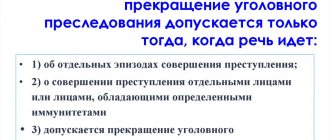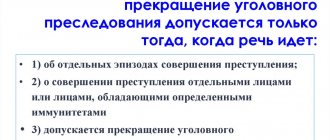Chapter 12 of the Criminal Code of the Russian Federation “Exemption from punishment” includes 6 types of exemption from punishment:
— Conditional early release from serving a sentence (Article 79 of the Criminal Code of the Russian Federation);
— Replacement of the unserved part of the punishment with a milder type of punishment (Article 80 of the Criminal Code of the Russian Federation);
— Exemption from punishment due to a change in the situation (Article 80.1 of the Criminal Code of the Russian Federation);
— Exemption from punishment due to illness (Article 81 of the Criminal Code of the Russian Federation);
— Deferment of serving a sentence (Article 82 of the Criminal Code of the Russian Federation);
— Exemption from punishment due to the expiration of the statute of limitations for a court conviction (Article 83 of the Criminal Code of the Russian Federation).
These species are classified differently in the literature. The most common is the classification depending on whether release from punishment is associated with the fulfillment of any conditions specified in the law, or whether the court is obliged to release any citizen from punishment in the presence of certain circumstances - they distinguish between conditional and unconditional release from punishment.
Unconditional release includes:
1) conditional early release from serving a sentence (Article 79 of the Criminal Code of the Russian Federation);
2) due to a change in the situation (Article 80.1 of the Criminal Code of the Russian Federation);
3) in connection with a mental illness of a person, depriving him of the ability to understand the actual nature and social danger of his actions or to direct them, as well as a military serviceman in the event of a disease that makes him unfit for military service (Part 1, Part 3 of Article 81 of the Criminal Code of the Russian Federation );
4) due to the expiration of the statute of limitations for a conviction (Article 83 of the Criminal Code of the Russian Federation).
Exemption from punishment provided for in Art. 79, Art. 80, part 2 art. 81, art. 82 of the Criminal Code of the Russian Federation, is a conditional type.
The legal significance of exemption from punishment, as a general rule, is the annulment of all legal consequences of the crime committed, since in accordance with Part 2 of Art. 86 of the Criminal Code of the Russian Federation, a person released from punishment is considered to have no criminal record. However, if the release from punishment was conditional, then until the expiration of the probationary period the person continues to have a criminal record, which is taken into account when assigning punishment for a new crime committed during the probationary period.
Conditional early release from serving a sentence.
Conditional early release (PAROL) from serving a sentence can be applied by the court to persons serving detention in a disciplinary military unit or imprisonment.
The basis for the use of parole is the loss of social danger by the convicted person and the possibility of his final correction without serving the full sentence. According to Part 3 of Art. 79 of the Criminal Code Parole from serving a sentence can be applied only after the convicted person has actually served:
a) at least one third of the sentence imposed for a crime of minor or medium gravity;
b) at least half of the sentence imposed for a serious crime;
c) at least two-thirds of the term of punishment imposed for a particularly serious crime, as well as three-quarters of the term of punishment assigned to a person previously released on parole, if parole was canceled on the grounds provided for in Part 7 of Art. 79 of the Criminal Code.
In Part 4 of Art. 79 of the Criminal Code stipulates that in any case, the term of imprisonment actually served by the convicted person cannot be less than six months. First of all, it should be noted that this condition practically applies only to persons serving sentences for crimes of minor gravity, since for more serious crimes penalties in the form of imprisonment usually exceed one year.
Parole is applied by the court at the place where the convicted person is serving his sentence on the proposal of a specialized government body, and in relation to military personnel - by the command of military units and institutions entrusted with the execution of the sentence (Part 3 of Article 175 of the Penal Code).
Having recognized that the person serving the sentence has served the legally required part of the sentence imposed by the court and, judging by his behavior and attitude towards the performance of his duties, does not need to fully serve the assigned sentence for his correction, the court makes a determination on parole from serving exactly designated calendar period of punishment. In this case, the convicted person is not assigned any special probation period, since its function is performed by the unserved part of the sentence. By the same ruling, the court has the right to fully or partially release the convicted person from serving an additional type of punishment.
The new provision is that “using parole, the court may impose on the convicted person the obligations provided for in Part 5 of Art. 73 of the Criminal Code of the Russian Federation, which must be executed by him during the remaining unserved part of the sentence.” These may include responsibilities: not to change place of residence without notifying the specialized government agency that monitors the behavior of the parolee, not to visit certain places, to undergo treatment for alcoholism, drug addiction, substance abuse or venereal disease, to provide financial support to the family. The court may assign other duties to the parolee if this may contribute to the further correction of the person or the consolidation of his results.
The conditional nature of this type of release from serving a sentence is to establish control over the behavior of a person released on parole from serving the sentence assigned to him, and over the performance of the duties assigned to him by the court, as well as the possibility of revoking parole in case of violation of these conditions.
Violations of the requirements of parole from serving a sentence are recognized as:
1) violation of public order, for which an administrative penalty was imposed on the person, or malicious evasion of the duties assigned to him by the court upon parole;
2) commission of a crime through negligence during the unserved part of the sentence;
3) commission of an intentional crime during the same time.
Cancellation of parole from serving a sentence in case of violation of public order by the convicted person and evasion of duties is optional. The court can revoke parole only on the proposal of the authorities exercising control over the behavior of such a person. Only if the submission of these authorities is justified, the court makes a ruling on the cancellation of parole and the execution of the remaining unserved part of the sentence.
Criminal early release from punishment
Conditional early release is the cessation of the application of criminal punishment, which is associated with the achievement of the goals of punishment, before serving the established sentence, with the establishment of a certain probationary period for the released person, during which this person must prove his correction. If the terms of the probationary period are violated, the previously assigned punishment is resumed.
In most countries, parole is used only in cases with punishments involving the deprivation of liberty of the convicted person. Conditional early release can be partial (the execution of an additional punishment continues) or complete (the convicted person is released from the main and additional punishment).
Circumstances favorable to parole:
- exemplary behavior - compliance with the rules of the regime of serving a sentence, the requirements of the administration of the correctional institution, amateur activities, participation in the work of public organizations, regular attendance at training sessions, maintaining order in the correctional institution, the availability of incentives;
- honest attitude to work - conscientious work while in a correctional institution, adherence to labor discipline, fulfillment of assigned production tasks, desire to obtain professional qualifications, etc.;
- recognition of one's own guilt, fairness of punishment;
- compensation for damage caused to the victim;
- the desire to start a new life after release, to break with past criminal connections;
- the presence of a family, children, other relatives with whom the convict will live after release and for whom care is required;
- the possibility of employment in a business structure, at a specific enterprise, etc.
Exemption from punishment due to a change in the situation.
Article 80.1 of the Criminal Code of the Russian Federation determines that “a person who has committed a crime of minor or medium gravity for the first time may be released from criminal liability if it is established that, due to a change in the situation, this person or the act he committed has ceased to be socially dangerous.”
Thus, the law provides only three conditions for exemption from criminal liability when the situation changes :
1) committing a crime of minor or medium gravity;
2) the person ceases to be socially dangerous;
3) the committed act loses its social danger.
A person ceases to be socially dangerous when he proves by his behavior and attitude to work that he does not pose a social danger to society (has completed a course of treatment for alcoholism or drug addiction, works or studies conscientiously, changed his behavior for the better, has become law-abiding, has broken ties with criminal environment, etc.).
An act is recognized as having lost its social danger when certain conditions that determined the danger of this act no longer exist in society. For example, a person engaged in private medical practice, during the period of obtaining a license for the chosen type of activity, but did not have time to obtain it, through negligence caused harm to the health of the patient and was prosecuted under Part 1 of Art. 235 of the Criminal Code of the Russian Federation. During the investigation of the case, a license was obtained, and the person prosecuted began to have the legal right to engage in private medical practice. In this case, the act in question has ceased to be socially dangerous, and harm caused by negligence can be compensated through civil proceedings.
A change in the situation can be expressed, for example, in the conscription of the person who committed the crime into the army, his entry into work or into an educational institution. In the new environment, a more favorable opportunity appears for educational influence on the offender, control over his behavior, etc.
Exemption from punishment due to illness.
The Criminal Code of the Russian Federation of 1996 for the first time provided for exemption from punishment in connection with illness in an independent norm. Article 81 of the Criminal Code of the Russian Federation provides for three grounds for exemption from punishment:
a) mental disorder;
b) illness of another serious illness;
c) a disease of military personnel that makes them unfit for service.
According to Part 1 of Art. 81 of the Criminal Code “a person who, after committing a crime, develops a mental disorder that deprives him of the ability to realize the actual nature and social danger of his actions (inaction) or to direct them, is released from punishment, and the person serving the sentence is released from further serving it.”
The basis for exemption from punishment for persons who have developed a mental disorder after committing a crime is the impossibility of correcting such persons, since they lose the ability to perceive the coercive nature and corrective-educational meaning of state coercive measures, consisting of deprivation or restriction of rights and freedoms.
In accordance with the law, there are two possible options associated with the onset of a mental disorder: firstly, it occurs before a sentence is passed or before it is applied for execution; secondly, mental disorder occurs while the convicted person is serving his sentence. In the first case, the person is exempt from execution of the sentence if the sentence has already been passed, or from imposing a sentence if the illness occurred before the sentence was passed. In the second case, the person is released from further serving the sentence.
Part 2 Art. 81 of the Criminal Code of the Russian Federation provides for the possibility of exemption from punishment for persons who have fallen ill not with a mental illness, but with another serious illness that prevents them from serving their sentence. In this case, the impossibility of serving the sentence is determined, firstly, by the type of punishment imposed and, secondly, by the nature of the illness.
The basis for release from serving a sentence is the impossibility of correcting the convicted person in the conditions of serving the sentence and the use of corrective measures. Article 81 of the Criminal Code applies to persons who have fallen ill with one of the diseases included in the list established by the Ministry of Health of the Russian Federation, if inpatient treatment has not yielded positive results. The procedure for release is the same as for mental illness, only in this case the release is optional.
In accordance with Part 4 of Art. 81 of the Criminal Code, persons released from punishment due to mental or other serious illness, in the event of their recovery, may be subject to punishment if the statute of limitations provided for in Art. 78 and 83 of the Criminal Code of the Russian Federation.
In accordance with Part 3 of Art. 81 of the Criminal Code, military personnel are subject to release from further serving their sentence in the event of an illness that makes them unfit for military service. This provision applies only to those military personnel who are serving a sentence in the form of restrictions on military service, arrest or detention in a disciplinary military unit. The basis for their release from further serving the sentence is the impossibility of fulfilling the punishment associated with strict isolation from society (arrest) or with the performance of military duties. The impossibility of their implementation is due to the nature of the disease, which is so serious that the patient is considered completely unfit for military service.
Types of exemption from punishment
Depending on the characteristics and features of the grounds for release in the Criminal Code of the Russian Federation. We have already completed coursework
The topic highlights in more detail certain types of release from punishment and its serving:
- parole (Article 79);
- due to changes in the situation (Article 80.1);
- in connection with illness (Article 81);
- deferment of serving a sentence (Article 82);
- deferment of serving a sentence by a person suffering from drug addiction (Article 82.1);
- due to the expiration of the statute of limitations for a guilty verdict passed by the court (Article 83);
- in connection with the adoption of a new law in the Criminal Code, eliminating the criminality of the committed action or mitigating the punishment (Article 10);
- in connection with counting the time that has passed in custody (Part 5 of Article 72);
- suspended sentence (Article 73);
- due to amnesty and pardon (Articles 84 and 85);
- minors with the use of compulsory educational measures (Article 92).
Finished works on a similar topic
Coursework Grounds and types of exemption from criminal punishment 410 ₽ Abstract Grounds and types of exemption from criminal punishment 270 ₽ Examination Grounds and types of exemption from criminal punishment 230 ₽
Receive completed work or specialist advice on your educational project Find out the cost
A special role is played by the institution of replacing the unserved part of the punishment with a more lenient punishment (Article 80). In this case, the convicted person is released from a more severe punishment, the remaining part of the punishment is replaced by a more lenient one.
There are different types of exemption from punishment:
- Conditional character. Release is considered conditional if requirements are imposed on the behavior of the person being released in accordance with the law, failure to comply with which leads to the cancellation of the release. A person convicted as a result of the cancellation of a suspended sentence must serve the assigned sentence. This type of release is used for: parole (Article 79), deferment of serving a sentence (Article 82), deferment of serving a sentence by a person dependent on drugs (Article 82.1).
- Unconditional character. If the release is unconditional, no requirements are imposed on the behavior of the prisoner. This type of release from serving a sentence is applied when: the statute of limitations for a conviction has expired (Article 83); replacing the unserved part of the sentence with a more lenient punishment (Article 80); illness of military personnel or changes in the situation (Articles 80.1, 81).
Exemption from punishment due to the expiration of the statute of limitations on the conviction.
In criminal legislation, there is the institution of statute of limitations of a conviction, which means the expiration of the terms established by law, after which the conviction passed by the court cannot be carried out and the convicted person is released from serving the sentence assigned to him.
The length of the statute of limitations for the execution of a conviction is directly dependent on the danger of the crime committed. The Criminal Code of the Russian Federation has chosen the following indicator of the danger of the crime committed - its belonging to a certain category of crimes, which seems more rational.
A person convicted of committing a crime is released from serving a sentence if the court’s conviction was not carried out within the following periods, calculated from the date the sentence entered into legal force:
a) two years if convicted of a crime of minor gravity;
b) six years if convicted of a crime of average gravity;
c) ten years if convicted of a serious crime;
d) fifteen years if convicted of a particularly serious crime (Part 1 of Article 83 of the Criminal Code of the Russian Federation).
The expiration of the specified periods excludes the execution of a conviction under the current Criminal Code of the Russian Federation only on the condition that the statute of limitations has not been violated. However, the law provides for the possibility of suspending the statute of limitations if a convicted person evades serving his sentence. Evasion can be expressed in the fact that the convicted person will hide from the court before the sentence is executed, willfully leave the place of serving correctional labor, or will escape from the place of deprivation of liberty, etc.
The term stops running for the time of evasion from serving the sentence, its flow is resumed from the moment of detention of the convicted person or his voluntary surrender to serve the sentence. The time elapsed from the moment the court’s conviction came into force until the convicted person evaded serving his sentence is counted towards the statute of limitations (Part 2 of Article 83 of the Criminal Code).
Exemption from serving a sentence due to the expiration of the statute of limitations on a conviction is final and unconditional, since it cannot be canceled for any reason. Statutes of limitations do not apply to persons convicted of committing the most dangerous crimes against the peace and security of mankind: planning, preparing, unleashing or waging an aggressive war (Article 353 of the Criminal Code); use of prohibited means and methods of warfare (Article 356 of the Criminal Code); genocide (Article 357 of the Criminal Code); ecocide (Article 358 of the Criminal Code).
Grounds for exemption from criminal punishment
Definition 1
Exemption from punishment is the refusal of government bodies to impose criminal punishment on a convicted person in situations where a court has already been convicted.
The criminal legislation stipulates various grounds for exemption from criminal punishment and its serving. So, in Art. 83 of the Criminal Code states that when released from serving a criminal sentence as a result of the expiration of the statute of limitations on a court conviction, the basis is a significant reduction in the social danger of the person who committed the crime, achieving the goals and objectives of the punishment without its actual practical execution.
Replacing the part of the sentence that has not yet been served with a more lenient punishment (Article 80) and parole (Article 79) as a basis characterizes a certain degree of correction of a person convicted of a crime, who has proven by his behavior that he needs to be served in full punishment (for conditional early release) imposed by the court, or for the successful completion of the correction process, the use of another, more mitigated punishment (when replacing the unserved part of the punishment with a more lenient type of punishment) in the presence of a formal reason (mandatory prerequisite) - serving part of the sentence. A change in the circumstances of the basis for release upon release from punishment characterizes the loss of social danger of a person or a crime committed by him.
Are you an expert in this subject area? We invite you to become the author of the Directory Working Conditions
The basis for exemption from serving a sentence is the impossibility of achieving the punishment as a result of its execution due to the following circumstances:
- illness of the convicted person (Article 81);
- drug addiction (Article 82.1);
- pregnancy of the convicted person (Article 82);
- the presence of a woman or man (if he is the only parent) of a child under the age of 14 years (Article 82.1).
Grounds for exemption from punishment: acts of amnesty (Article 84); acts of pardon (Article 85); adoption of a criminal law that mitigates punishment or eliminates crime (Article 10).
Replacement of the unserved part of the sentence with a more lenient type of punishment.
According to Art. 80 of the Criminal Code of the Russian Federation, substitution of punishment can be applied to persons serving detention in a disciplinary military unit or imprisonment.
The material basis for replacing the unserved part of the sentence with a milder type of punishment is firm establishment on the path of correction, as evidenced by his good behavior, including a conscientious attitude to the performance of duties during the period of serving the imprisonment imposed by the court.
The law establishes two conditions necessary for replacing the unserved part of the sentence with a more lenient type of punishment. The first concerns the gravity of the crime committed, for which the convicted person is serving a sentence. The second condition concerns the size of the part of the imposed punishment, after the actual serving of which deprivation of liberty can be replaced by a more lenient type of punishment. of the Criminal Code of the Russian Federation in Part 2 of Art. 80 determines that the unserved part of the punishment can be replaced by a more lenient type of punishment after the person sentenced to imprisonment has actually served :
- crimes of minor or medium gravity - at least one third of the sentence;
- serious crime - at least half of the sentence;
- especially serious crime - not less than two-thirds of the sentence.
The question of the application of Art. 80 of the Criminal Code of the Russian Federation is considered by the court at the location of the correctional institution on the proposal of the administration of this institution. Having established the existence of the necessary grounds and conditions, the court may replace the remainder of the assigned term of imprisonment with any milder type of punishment in accordance with the types of punishments specified in Art. 44 of the Criminal Code of the Russian Federation.
When replacing the unserved part of imprisonment with a milder type of punishment, the convicted person, at the discretion of the court, may be fully or partially released from serving an additional type of punishment imposed by a court verdict (Part 1 of Article 80 of the Criminal Code).
Replacing imprisonment with another punishment is an optional type of release from serving a further sentence and is the right of the court, and not its obligation. However, the release cannot be revoked due to misconduct by the releasee.
Deferment of serving a sentence.
The basis for applying this type of exemption from punishment is the inexpediency of further serving a sentence by a pregnant woman, a woman with a child under the age of 14, or a man with a child under the age of 14 and who is the only parent.
The law provides two conditions necessary for granting a deferment of serving a sentence. Firstly, the woman’s pregnancy, the child’s age not exceeding 14 years, and the fact that the man is the only parent must be established.
The second condition is that the woman or man has not been sentenced to imprisonment for a term of more than 5 years for a serious or especially serious crime against a person (there are about 20 such crimes). With this exception, a reprieve may be granted to everyone, regardless of the nature of the crime and the punishment imposed. However, it can be provided both at sentencing and while serving the sentence.
In accordance with the law, the behavior of convicts for whom the serving of their sentence is suspended is monitored by a specialized government agency. Evasion of a mother or father from raising a child is considered a violation of the terms of the deferment and entails a penalty in the form of a written warning announced by the state body exercising control. If the convicted person continues to evade raising the child after a warning, the court, upon the proposal of the supervisory authority, has the right to cancel the deferment granted. The same thing entails the mother (father) abandoning the child and transferring him to an orphanage.
In accordance with Part 3 of Art. 82 of the Criminal Code of the Russian Federation, when a child reaches 14 years of age, the court is obliged to consider the consequences of the expiration of the deferment time. The law gives the court the right to make any of two possible decisions: to finally release the person from serving the sentence or the remaining part of the sentence, or to replace the remaining part of the sentence with a more lenient type of punishment. This issue is considered by the court at the place of residence of the convicted person and is decided taking into account his behavior and attitude towards fulfilling the duties of raising a child during the reprieve.
Termination of serving a sentence and the procedure for releasing convicts
The procedure for releasing convicts from serving their sentences is contained in the Penal Code of the Russian Federation. In the first stage, the prisoner is notified that he can be released. The period depends on the circumstances. If the sentence is about to end, 30 days' notice is given, if the prisoner is due to be released on parole, on the same day the person leaves prison.
Note!
The former prisoner is given things, valuables and money that were kept in his account. He is also given a passport, papers on release from sanctions and documents on work activity in prison.
A prisoner can be released on parole on the same day when the court decision or ruling comes into force. The same applies to early release with pardon and amnesty.
In some cases, persons released are subject to supervision. Especially if the citizen served a sentence for a dangerous or especially dangerous recidivism, crimes against the sexual integrity of a minor, as well as for committing a serious or especially serious crime. They can also control their further residence in cases where the prisoner has repeatedly been caught violating the order in a correctional institution. Supervision is carried out by district commissioners.







